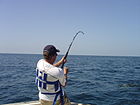Game fish

Game fish or quarry are fish pursued by recreational anglers. They can be freshwater or saltwater fish. Game fish can be eaten after being caught. Some game fish are also targeted commercially, particularly salmon.
Examples[]


The species of fish pursued by anglers varies with geography. Some fish are sought for their value as food, while others are pursued for their fighting abilities or for the difficulty of pursuit.
- Big-game fish are bony saltwater fish such as tuna, tarpon, and billfish (sailfish, marlin and swordfish).
- In North America, many anglers fish for common snook, redfish, salmon, trout, bass, pike, catfish of several species, walleye, and muskellunge. The smallest fish routinely sought by anglers are called panfish, because they can fit in a normal cooking pan. Examples are crappies, perch, rock bass, bluegills, and other sunfish (Centrarchidae). Panfish are often sought by younger anglers, at least partly due to the relative ease with which they can be caught.
- In the United Kingdom, "game fish" refers to salmonids (other than grayling) – that is, salmon, trout, and char. Other freshwater fish are called coarse fish or rough fish.
Some popular game fish have been transported worldwide. Rainbow trout, for instance, can now be found nearly anywhere the climate is appropriate, from their original home on the Pacific Coast of North America to the mountains of southern Africa.[1]
Game-fish tagging programs[]
As part of the catch-and-release practice encouraged to promote conservation, tagging programs were created. Some of their goals are to improve the management of fisheries resources and to keep records on abundance, growth rates, age, migrations, and strain identification.
Some well-known tagging programs in the United States are the South Carolina Marine Game Fish Tagging Program and the Virginia Game Fish Tagging Program. The South Carolina Marine Game Fish Tagging Program began in 1974 and it is now the largest public tagging program in the Southeastern United States. Anglers are trained and then receive a tag kit with tags, applicator, and instructions. When they tag a fish, anglers use a reply postcard they receive in advance to send the information on the tag number, tag date, location, species, and size. This program issues anglers who tag and release 30 or more eligible species within a year a conservation award. When an angler recaptures a tagged fish, he then should report the recapture. If possible, the tag number and the mailing address should be reported, along with the location and date of the recapture, as well with the measurement of the fish. The objective is to provide biologists with the necessary information to determine growth rate through an accurate measurement.[2] The Virginia Game Fish Tagging Program started operations in 1995 and keeps records on recaptured fish since then. This is an annual program that starts in January and it is limited to 160 anglers. Anglers receive training workshops in February and March.[3]
Records[]
The official guide to world salt- and freshwater fish records is the World Record Game Fishes, published annually by the International Game Fish Association (IGFA), which maintains records for nearly 400 species around the world. The records are categorised, with separate records for juniors, for the type of tackle and line used, for fly fishing, and locality records.[4] The IGFA also organize the world saltwater championship tournaments.[5]
See also[]
- Fishing tournament
- Coarse fishing
- List of freshwater game fish
- List of marine game fish
- Game (hunting)
References[]
- ^ Skelton, Paul (2001). A complete guide to the freshwater fishes of southern Africa (New ed.). Cape Town: Struik. p. 72. ISBN 9781868726431.
- ^ "SC Marine Game Fish Tagging Program". Archived from the original on 9 May 2010. Retrieved 7 May 2010.
- ^ "Virginia Game Fish Tagging Program". Retrieved 7 May 2010.
- ^ Fishing Book Review: World Record Game Fishes About.com. Retrieved 19 April 2009.
- ^ World Championship Tournaments Archived 10 February 2010 at the Wayback Machine – International Game Fish Association
Sources[]
- Dunn, Bob (2000) Saltwater Game Fishes of the World. Australian Fishing Network.ISBN 978-1-86513-010-1
- Recreational fishing
- Sport fish



